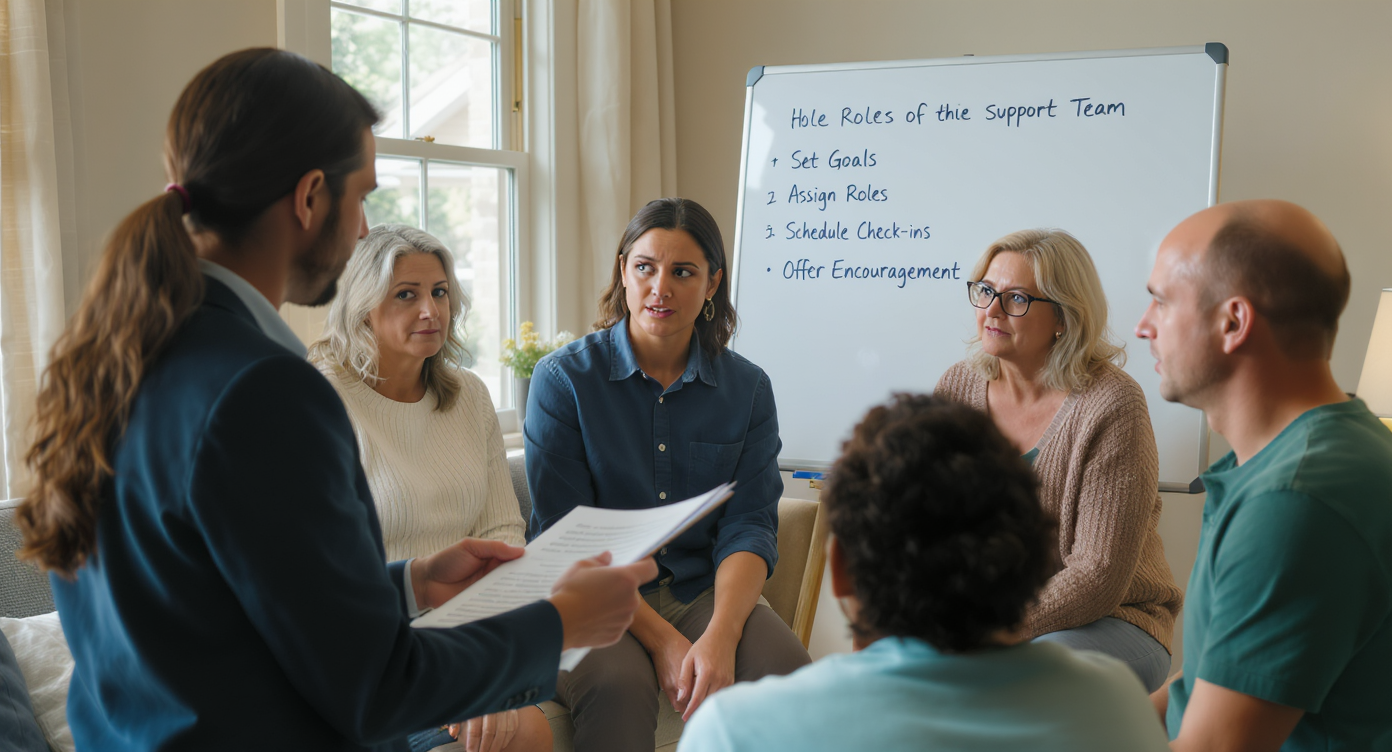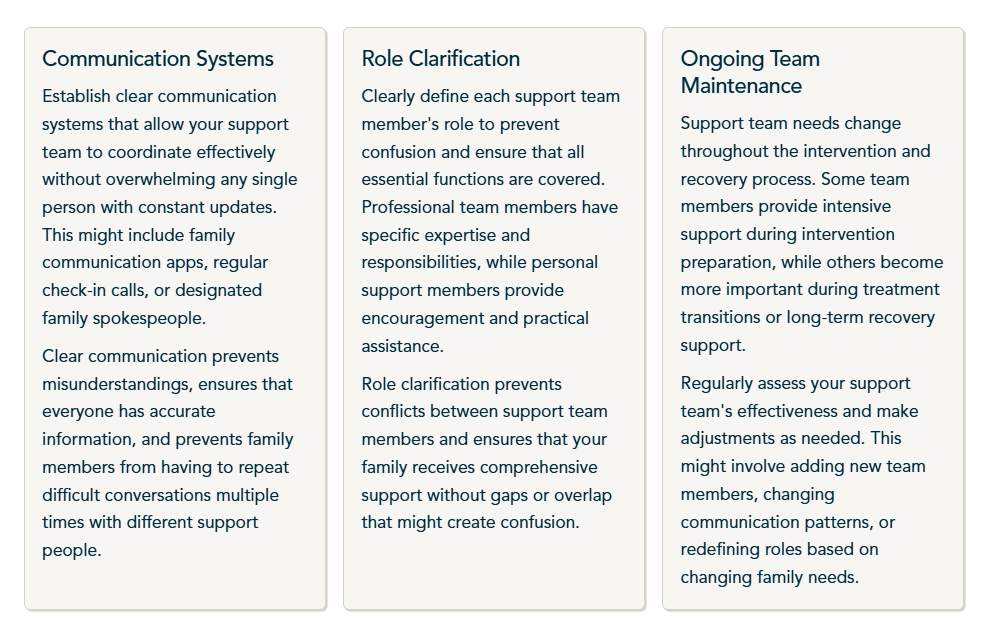
“Who should be involved in our intervention?” This question reveals one of the most critical—and often overlooked—aspects of intervention preparation. After progressing from primary therapist to clinical director in treatment centers, I’ve observed that intervention success depends significantly on the support team assembled during preparation, not just the intervention day participants.
Many families approach intervention as a single event requiring only the people who will be present during the actual conversation. This limited perspective misses the comprehensive support system necessary for sustained intervention success and long-term recovery support.
As a Licensed Marriage and Family Therapist (LMFT) and Licensed Mental Health Counselor (LMHC), I can guide you through creating a support team that provides both intervention effectiveness and ongoing recovery foundation.
Understanding the Support Team Concept
Successful intervention requires a carefully assembled support team that provides expertise, emotional support, and practical assistance throughout the process. This team includes both professional and personal support members, each contributing essential elements to intervention success.
Your support team serves multiple functions that no single person can provide alone:
Clinical team members bring clinical expertise, intervention experience, and objective perspective that family members cannot provide for each other.
Personal support members provide emotional encouragement, practical assistance, and ongoing motivation that professionals cannot maintain long-term.
The combination creates comprehensive support that sustains families through intervention preparation, implementation, and recovery challenges.

The Intervention Specialist
Your intervention specialist serves as the primary professional team coordinator and provides clinical expertise throughout the preparation process. Choose someone with appropriate clinical credentials, extensive intervention experience, and family systems training.
Professional intervention specialists understand family dynamics, addiction psychology, and treatment system navigation. They provide objective perspective during emotionally charged family discussions and help maintain focus on intervention success rather than family conflict resolution.
What to look for:
- Licensed in behavioral health
- Specific intervention training and certification
- References from other families they’ve helped
- Clinical background including addiction specialization
- Family therapy experience
Treatment Center Professionals
Your support team should include treatment center professionals who understand your loved one’s specific needs and can provide appropriate treatment recommendations. This might include primary therapists, medical professionals, psychiatric specialists, or other treatment team members.
Treatment professional involvement during preparation ensures that intervention plans align with appropriate treatment options and that your family understands realistic treatment expectations. This coordination prevents unrealistic treatment promises that create disappointment and reduce motivation.
Healthcare Providers
If your loved one has medical conditions that complicate addiction treatment, integrate healthcare providers into your support team during preparation. This ensures that intervention plans consider medical needs and that treatment recommendations address both addiction and health concerns.
Medical complications might include diabetes, heart conditions, mental health disorders, or medication dependencies that require specialized treatment approaches. Healthcare provider input during preparation prevents medical crises during intervention or treatment.
Personal Support Team Members
Family Members and Close Friends
Personal support team members include family members, close friends, support group participants, and others who provide emotional encouragement and practical assistance. These people understand your family’s situation and provide hope and motivation during challenging times.
Personal support members don’t need addiction expertise, but they should understand that addiction is a disease rather than moral failing. They should be able to maintain confidentiality about your family’s situation and provide encouragement without judgment or unsolicited advice.
Choose support people who:
- Understand addiction as a disease
- Can maintain confidentiality
- Provide hope and encouragement rather than judgment
- Are available for ongoing support, not just crisis response
- Have healthy boundaries and communication skills
Support Group Connections
Support groups such as Al-Anon, Nar-Anon, or family therapy groups provide connection with other families who understand your experience. These groups offer practical advice, emotional support, and hope from families who have navigated similar challenges successfully.
Support group participation often provides perspective and encouragement that family and friends cannot offer, simply because they haven’t experienced addiction’s impact firsthand. Many families find that support groups become essential resources for long-term recovery support.
Building Professional Support Relationships
Selecting Your Primary Intervention Specialist
Your primary intervention specialist should coordinate your clinical team and provide ongoing guidance throughout the preparation process. This relationship often continues throughout treatment and early recovery, providing continuity and expertise when challenges arise.
Schedule initial consultations with potential intervention specialists to assess their approach, experience, and compatibility with your family’s needs. The right professional relationship provides both clinical expertise and emotional support during one of your family’s most challenging times.
Coordinating Treatment Options
Work with your intervention specialist to research and coordinate appropriate treatment options before intervention day. This preparation ensures that you have realistic treatment recommendations and that logistics are arranged if your loved one accepts treatment.
Treatment coordination includes insurance verification, program availability, transportation arrangements, and family involvement planning. Advance preparation prevents delays that might reduce intervention momentum or provide opportunities for your loved one to change their mind.
Coordinating Your Support Team

Clinical Guidance for Team Building
Creating an effective intervention support team requires understanding of family systems, addiction psychology, and recovery processes that most families don’t possess naturally. Professional guidance helps ensure that your support team addresses all essential functions without overwhelming your family or creating conflicts.
My experience in treatment centers, combined with family systems training, provides the framework for building support teams that sustain families through intervention challenges and long-term recovery support.
If you’re feeling overwhelmed by the complexity of intervention preparation, remember that building your support team is the first step toward clinical intervention success. You don’t have to navigate this crisis alone.
Ready to Build Your Support Team?
If you’re ready to begin assembling your intervention support team and want detailed guidance through each step, download our Pre-Intervention Planning Toolkit. This comprehensive resource provides templates, checklists, and strategies for building the professional and personal support your family needs.
For personalized guidance in building your intervention support team and assessing your family’s specific needs, I offer confidential consultations to help you create an effective support system.
Professional guidance. Comprehensive support. Your family’s path to healing starts with the right team.
About David Gulden:
Licensed Marriage and Family Therapist (LMFT), Licensed Mental Health Counselor (LMHC), and certified interventionist specializing in family systems approaches to intervention and recovery support.
Contact Information:
- Phone: (407) 501-8490
- Toll Free: 888-508-HOPE
- Email: [email protected]
- Website: www.anewhoperecovery.com
